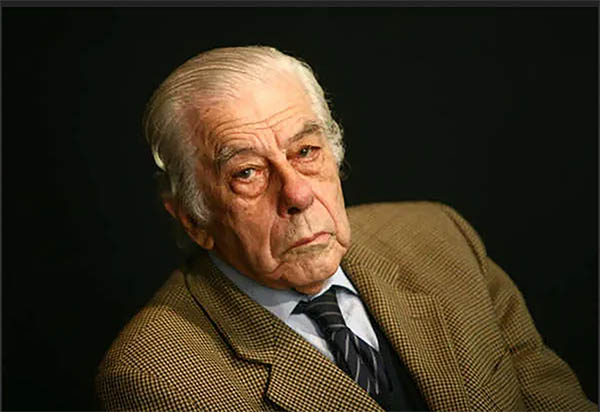On May 25, the architect Gonçalo Ribeiro Telles celebrated 98 years of life. A long life scented with poetry and landscape distinction. As he would say, everything needs common sense and good taste, everything deserves to be done with weight, weight and measure.
To commemorate, simply, another anniversary of the architect Gonçalo Ribeiro Telles, I leave here for readers a very brief reflection on two fundamental references of the architect, the green plan and the gardens, which he called paradise.
Now that there is so much talk about tourism and touristification, now that the ascending cycle seems to be compromised, it is never too late to emphasize two fundamental themes that are closely linked: on the one hand, underlining the distinctive landscape, green spaces and the organic vision of the city, on the other hand, highlight the immaterial resources of memory, imagination and culture in city planning.
In both cases, the reference to the gardens of paradise by Gonçalo Ribeiro Telles reveals an absolutely stunning illustration.
The green plan and the organic vision of the city
Here are the assumptions of the GRT smart city green plan:
– The city is not a puzzle of territorial units designed by the way the road structure is related to the type of building,
– Unidentifiable structures and urban voids do not guarantee, by themselves, the constitution of a useful and effective green structure,
– Green spaces cannot be residual spaces, but substantial spaces that organize the space,
– The city is not a zoned set of independent areas, only identifiable by the way the car relates to the residential blocks,
– The city must overcome the inadequate conventionalism of the vegetal composition that today involves, for example, the garden treatment in roundabouts and separation strips,
– The image of the city must be defended through a mapped system of views that determine the size of buildings, the distribution and shape of vegetation and the framing of infrastructures,
– In city planning in the XNUMXst century, it is essential to consider “operating units” with ecological content with planning autonomy, whenever necessary, without which biophysical sustainability, environmental quality and food supply will be at stake.
– In this comprehensive and organic system of communicating vessels, the green plan is an essential instrument in the conception of the city's outdoor spaces, whose design autonomy is required by its own biophysical and cultural background and by the practice of the arts that have long served the construction of the living landscape.
the gardens of paradise
When talking about landscape distinction, amenities and resources of memory and imagination, it is almost mandatory to refer to the ethical and aesthetic principles enunciated by the architect Gonçalo Ribeiro Telles (GRT) regarding his "gardens of paradise" which are a kind of poetry of the nature, a romantic walk through a landscape of aesthetic and literary inspiration. Let us review these principles and appreciate their elegance.
First, bet on the “sublimation of the place” making it pleasant and happy.
Secondly, invest in the “presence of water”, in its aesthetic serenity that gives a rhythmic movement and musical dynamics to the garden.
Third, invest in species that emphasize the “power of nature and its biological diversity” and that enhance the pace of life.
Fourthly, take advantage of the “natural luminosity of spaces”, the splendor of light is achieved through the shadow-light contrast and the harmony of colors.
Fifthly, let yourself be influenced by the “geometry and depth of perspectives”, the cut of successive planes values distances and shapes.
Sixth, promote the “integration of the garden into the surrounding landscape” whenever it is orderly and beautiful.
Seventh, accept the “natural order as the basis of the garden design”, that is, let yourself be inspired by the order of nature.
Eighth, value the “cultural aspects of the landscape”, as the cultural order is the order of humanity.
Ninth, avoid excesses and exalt “simple ordering of things”, do not decorate for the sake of decoration, in other words, decorativism.
In tenth place, a garden and a landscape are the result of conceptions and projects and never of arrangements or decorations, so their “greatness and beauty derives from what is essential to them in the right measure”.
The eloquence and elegance of these principles speak for themselves. It is now better understood why the concepts of global landscape and landscape unit preside over his conception of planning and production systems.
In other words, with GRT, the ecological factor, the production factor and the cultural factor are not compartmentalized in “administrative silos” and therefore demand a different conception of administrative policy and policy administration. As simple as that.
Final grade
Territorial distinctive signs are the brand image of a territory. One of those signs is the landscape distinction. In a time of "total tourism", it is not only the gentrification of towns and cities that should concern us, it is also the excessive gamification and, above all, the criterion and the way we dispose and use scarce resources such as water, soil and vegetation, in the end, the global landscape that welcomes us.
Let's not simplify then. We are all, in our own way, caretakers of the landscape.
But let us not delude ourselves. There is a specific literacy of the landscape, which needs to be properly addressed, otherwise our perception of the landscape is a crime against our country and a bad service to the country.
Perhaps it is time to return to the unitarism of other times, returning to politics and public causes, rehabilitating the ideological discourse on the occupation of our territory before we have to recover it in any occasional auction here or abroad.
A hug and long life to architect Gonçalo Ribeiro Telles!
Author António Covas is a Retired Full Professor at the University of Algarve



















Comments